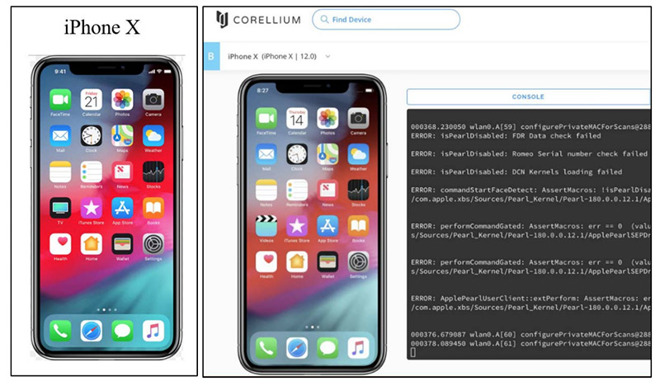Software virtualization company Corellium on Monday announced an expansion of services that allows customers with individual accounts to virtualize iPhone and iPad devices.
The company, fresh off of a court victory against Apple, had previously restricted iOS device virtualization to enterprise accounts via its CORSEC platform. Android tools have been available to both enterprise and individual users.
The new policy allows security researchers and others to run virtual iPhone and iPad models on their host machine without paying for an enterprise license. Users pay based on the number of virtualized cores or devices and the service is available as either a monthly subscription or a pay-as-you-go rate.
With our monthly subscription model, you are allotted a certain number of CPU cores, and you can run as many virtual devices as that number of CPUs will permit at a time. For instance, if you have a 12-core account, you can spin up two virtual Phone 11’s for your first test run, then you could turn those off for storage and create six iPhone 7’s for the next test. For every two active CPU cores allotted to your account, you can store up to five devices in an Off state.
With our usage-based model, you can run as many virtual devices as you want at a time, and you will be charged a flat rate per core per hour. This means 6-core models will be more expensive to run per hour than 2-core models. Stored devices are charged per device (not per core), and they are charged per day rather than per hour.
CORSEC is a Corellium technology that allows the creation of a virtual iOS device in the cloud. Users select a device to copy and then download an iOS build directly from Apple’s servers. This creates a “fully functioning” replica device.
Apple sued the company in 2019, as Corellium software is designed to replicate iOS to allow security researchers to locate bugs and security flaws. A Florida judge in December 2020 threw out Apple’s claims that Corellium violated copyright law with its software. The judge ruled that Corellium operates under fair use terms.
Corellium touted its software product as running “real iOS — with real bugs that have real exploits,” Apple had not licensed iOS, iTunes, or its user interface technologies for use by Corellium.
Apple said Corellium’s servers were illegally hosting numerous copies of iOS. The alleged infringement also included copies of iTunes. Apple said the company didn’t appear to require its customers to limit the use of its products to research and testing, nor did the firm require customers to disclose discovered bugs and vulnerabilities to Apple.
“Corellium has simply copied everything: the code, the graphical user interface, the icons – all of it, in exacting detail,” Apple said in the original filing.


